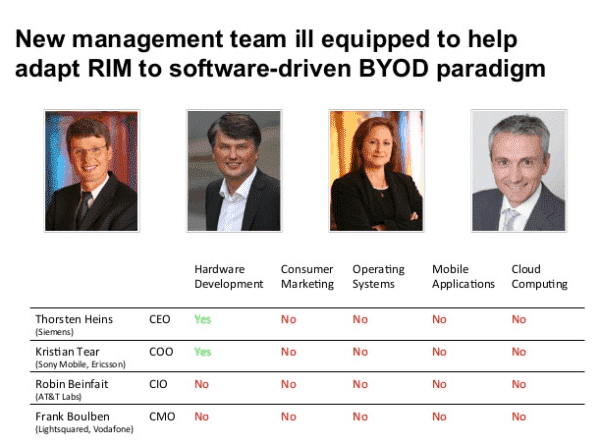
Yesterday, a day in which 4500 people lost their jobs, was the worst in the history of BlackBerry, topping four or five other days that have all occurred within the past five years.
The company’s slow motion train wreck -from the excruciating wait for a new platform to the company’s underwhelming tablet entry, the Playbook, to (most gut-wrenchingly of all for its supporters) the failure of BlackBerry 10 to resurrect the company’s fortunes- has made a lot of Monday morning quarterbacks feel like sages.
The knives have been sharpened and repeatedly stabbed into BlackBerry’s soft, overripe flesh by many who forget that every tech company with any sort of history has had to shrink before resuming growth, and that even the newly sainted Steve Jobs once went cap-in-hand to his old friend Bill Gates, who saved Apple, on August 6th, 1997.
BlackBerry may or may not emerge from Friday, September 20th, 2013, but the odds are now stacked against its continued existence as a stand-alone entity. My intent here on Saturday, September 21st isn’t to chronicle the history of its questionable decisions, but to show that there were clear and credible voices that saw what BlackBerry was doing and warned against it. These weren’t the wags intent on reveling in the company’s failure, though there were more than plenty of those, but some of those closest to the company, who had an emotional history with the brand, and wanted BlackBerry to thrive.
The most obvious of these was much-maligned ex co-CEO Jim Balsillie. When the shakeup at the top happened that left rookie Thorsten Heins in charge, where was Balsillie’s mind? Remember that he wanted RIM to pursue licensing strategies; allowing other platforms to use BlackBerry’s network and products. Heins was adamant that the company should not do this.
_________________

This story is brought to you by Serenic (TSXV:SER). Serenic’s cash position as of its most recently reported quarter was greater than its market cap as of September 20th, which was $3.22-million. The company has zero long-term debt. Click here for more info.
__________________
Today, one of the few things that critics agree Blackberry is getting right, if a tad late, is launching BlackBerry Messenger as a cross platform offering. A sad punctuation mark to yesterday’s news is that Apple and Samsung users will get to try BBM for the first time today.
Ballsillie’s views were echoed was by a man who once had him on his board of directors; Descartes Systems Group CEO Art Mesher, who in Cantech Letter months prior to the launch of BlackBerry 10 warned that the real danger at BlackBerry was that its corporate decisions were being driven by “gadget geeks” who were in denial of systems evolution theory.
Mesher pointed to IBM’s decision to get out of the PC market in 2004 as potentially instructive to BlackBerry’s then-current situation.
“Historically, since the advent of the microprocessor,” said Mesher, “hardware has become a commodity over time leading to a new world of open applications and content.” IBM’s successful decision to discontinue making hardware that was rapidly commoditizing and focus on a more profitable services and networks model was one blueprint available to BlackBerry, he said.
Mesher’s ideas were theories. He didn’t, as far as I know, march the few miles over to BlackBerry’s headquarters and pound the table for his plan. But last summer, that’s essentially what happened, when an “elite dream team” of designers and engineers who were self-confessed “CrackBerry” addicts, set out to convince management that its upcoming BlackBerry 10 platform was an “albatross” and that it should go in a different direction to save the brand, which they described as “the only other true brand in mobile along with Apple.”
Sometime between June and August of last year, Robin Chan, a Silicon valley entrepreneur and angel investor, pitched BlackBerry management on “Project BBX, Turnaround Strategy” which would double down on the company’s strengths in security and enterprise and open its networks to iOS and Android.

“Essentially, what we were doing was a coup d’etat, Chan told The Verge in August. The plan ultimately failed to gain enough interest and was shelved.
The 33-page slide deck for the project was posted online by Chan recently. On page 16 he begins a point form case study.
“IBM, a pioneer of mainframe computers failed to adapt to the PC paradigm brought upon by Intel and Microsoft,” begins the slide. “Led by outsider CEO Louis Gerstner, IBM reinvented itself, leveraging its intellectual property, trusted brand, and deep access to the enterprise to build a global solutions company which combined services, hardware and software,”.
On page 18, the comparison concludes with a slide entitled “BlackBerry at a similar decision point.”
There are a lot of unanswered questions about BlackBerry as a business right now, but perhaps the most interesting of all is whether “Project BBX” is still a viable option, or whether we are now long past that decision point.
__________________

__________________
Comment
Leave a Reply
You must be logged in to post a comment.





 Share
Share Tweet
Tweet Share
Share




A very good article. How can a company be so wrong in selecting such an unqualified management team? These are the four executive plus Ms. Barbara Stymiest, that should never have been in Blackberry’s management. But how can a company get rid of these members if they don’t resign? My guess is by shareholder demand. The damage is done. Now the shareholders just have to see what happen in the coming month, and act accordingly. For this company to have future and survive.
“Yesterday, a day in which 4500 people lost their jobs”
False. The lay off is being done over the course of 3 quarters. No one from the 4500 has been laid off yet. Get your facts right.
Hind site is always 20 – 20 but the times it took them to get their new phones to the market was way to long and their marketing was a total disaster. They were always late and trying to catch up to the other players that had got their first! Focusing on their strengths is definitely a good idea but on top off that I would have spun off the hard ware part of the company and put an entrepreneurial marketing type management in charge of it. RIM had become just an old mainstream organization that could not spin out products fast enough and could not market then to the masses properly. JMO.